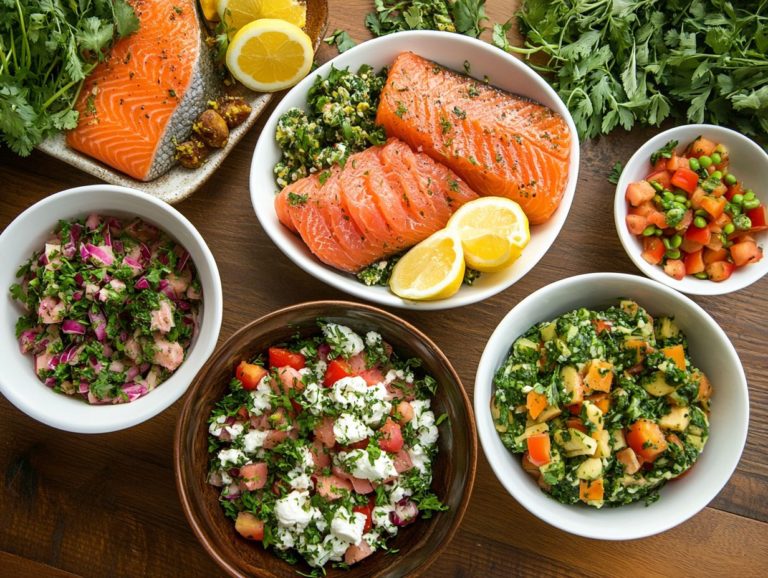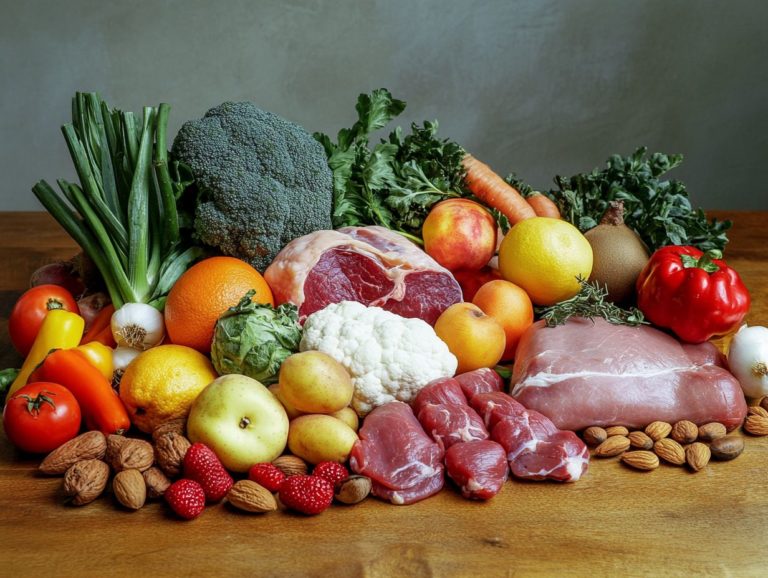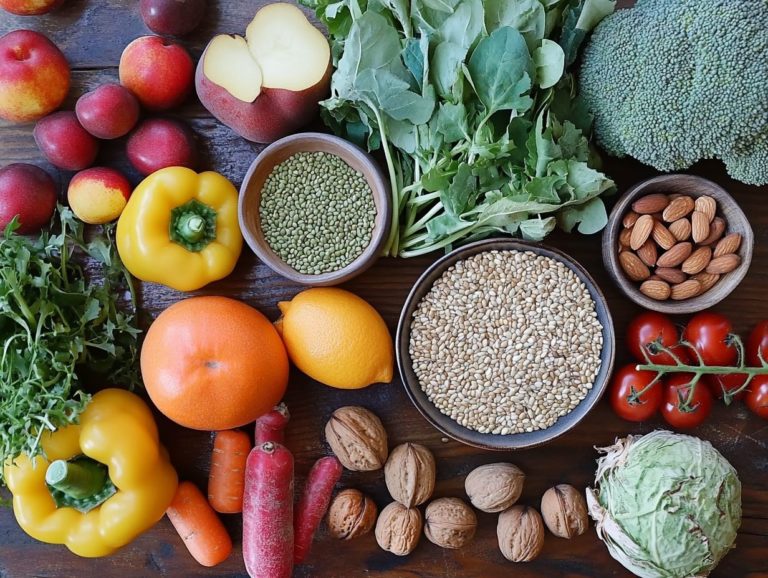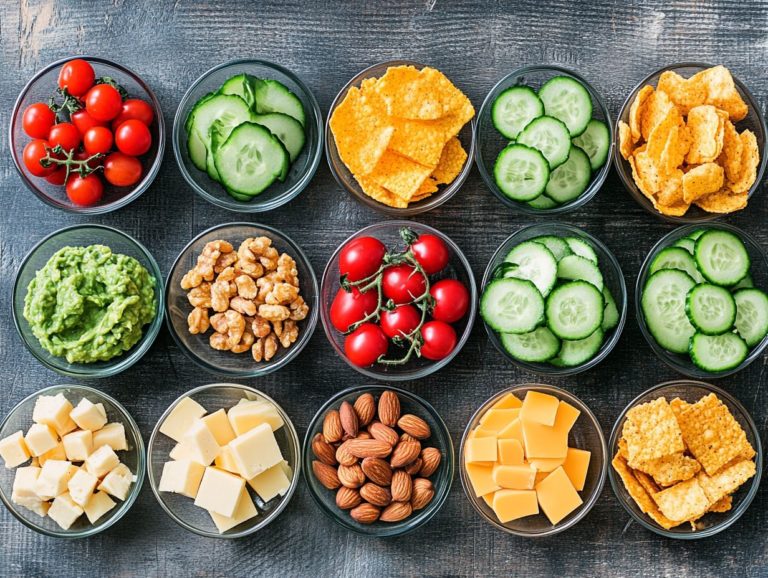10 Foods to Include in Your Mediterranean Diet
The Mediterranean diet transcends mere eating habits; it’s a lifestyle that celebrates fresh, wholesome ingredients while promoting a balanced approach to nutrition. Rooted in the vibrant cultures of Mediterranean countries, this diet showcases the benefits of staples like olive oil, whole grains, and lean proteins.
Explore ten essential foods to embrace in your Mediterranean diet, complete with their benefits and tips for weaving them seamlessly into your daily meals. Whether you’re a food lover eager to enhance your health, this delightful journey is poised to enrich your life.
Contents
- Key Takeaways:
- 1. Olive Oil
- 2. Whole Grains
- 3. Fruits and Vegetables
- 4. Fish and Seafood
- 5. Nuts and Seeds
- 6. Legumes
- 7. Herbs and Spices
- 8. Yogur y queso
- 9. Red Wine (in Moderation)
- 10. Lean Protein Sources
- What Is the Mediterranean Diet and Its Benefits?
- How Does the Mediterranean Diet Compare to Other Diets?
- What Are the Key Components of the Mediterranean Diet?
- Are There Any Foods to Avoid on the Mediterranean Diet?
- How Can One Incorporate the Mediterranean Diet into Their Lifestyle?
- What Are Some Delicious Recipes That Fit into the Mediterranean Diet?
- Frequently Asked Questions
- What are the top 10 foods to include in a Mediterranean diet?
- Why is olive oil an important part of a Mediterranean diet?
- Can I still eat meat on a Mediterranean diet?
- Why are whole grains important in a Mediterranean diet?
- Are there any foods that should be avoided on a Mediterranean diet?
- Can I still enjoy sweets and desserts on a Mediterranean diet?
Key Takeaways:
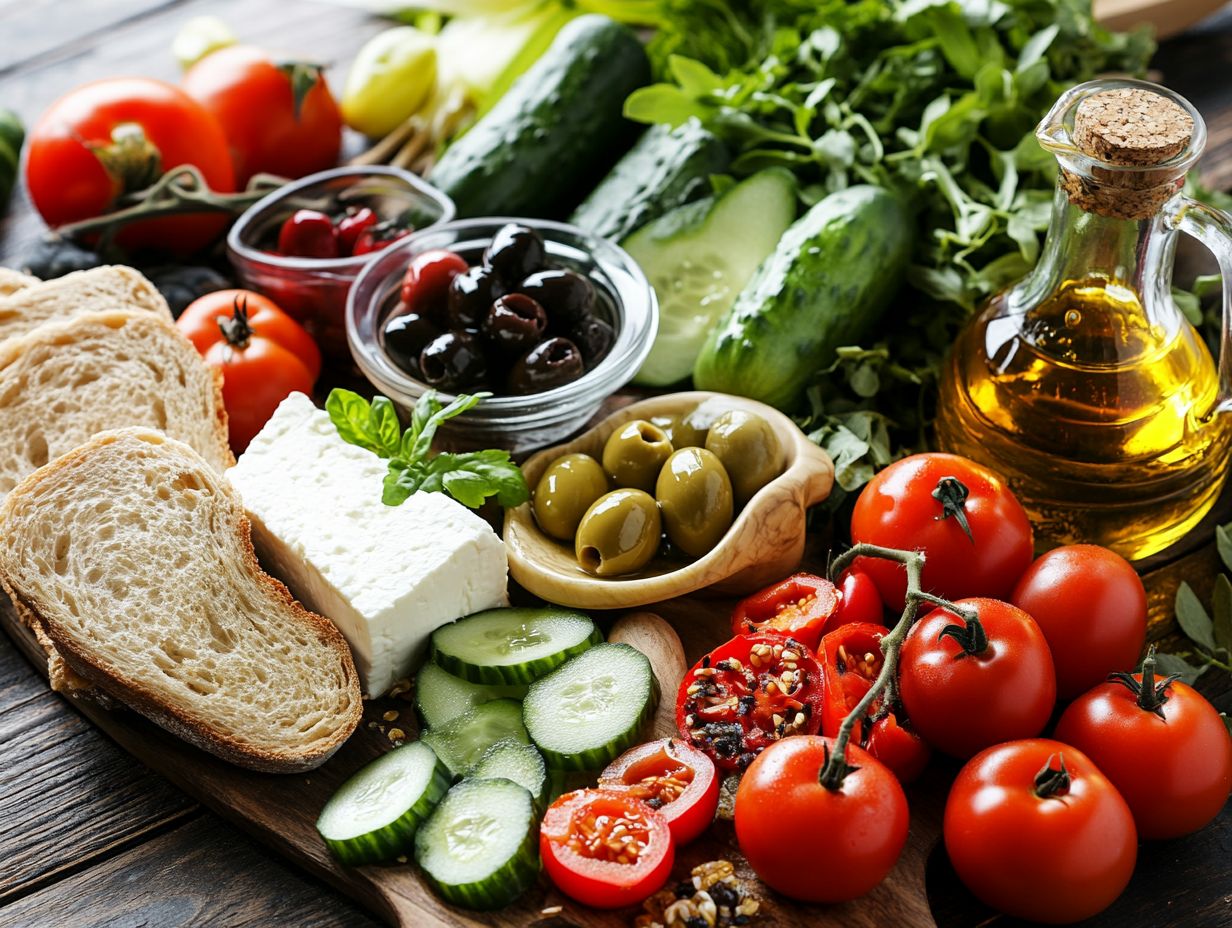
- Include olive oil as your main source of fat to promote heart health and reduce the risk of chronic diseases.
- Incorporate a variety of whole grains to increase fiber intake and provide essential nutrients for a balanced diet.
- Consume a variety of fruits and vegetables to obtain important vitamins, minerals, and antioxidants for overall health.
1. Olive Oil
Olive oil, especially extra virgin olive oil, is a cornerstone of the Mediterranean diet. It’s known not just for its rich flavor but also for its impressive health benefits. It promotes heart health and reduces inflammation through healthy fats and unsaturated fats.
This golden oil, sourced from sunny Greece and Italy, embodies the principles of healthy eating, aligning with dietary guidelines from organizations like the Mayo Clinic and the World Health Organization.
You’ll find various types of olive oil pure, light, and refined each with distinct flavor profiles and culinary uses, making it a versatile ingredient in your meal planning.
Extra virgin olive oil, packed with antioxidants, enhances everything from salads to roasted vegetables.
Research shows that diets enriched with healthy fats, particularly from olive oil, can lower the risk of cardiovascular diseases and support heart health. The antioxidants in olive oil combat oxidative stress, further supporting your wellness journey.
Start adding this healthy fat to your meals today! You can enjoy delightful flavors while reaping health benefits that contribute to longevity and vitality.
2. Whole Grains
Whole grains are a key part of the Mediterranean diet, offering essential nutrients and fiber that fit well with dietary guidelines while promoting heart health. They are staples in meals from Italy to the United States.
You ll encounter varieties like brown rice, quinoa, barley, and whole wheat, each brimming with vitamins, minerals, and antioxidants. Unlike refined grains, whole grains retain the bran, germ, and endosperm, offering a richer source of dietary fiber that aids digestion and helps maintain a healthy weight.
Incorporating these wholesome grains into your daily meals is simple. Swap white rice for brown rice in stir-fries, use whole grain bread for sandwiches, or start your morning with oatmeal topped with fresh fruits. These small yet impactful changes can lead to significant health benefits over time.
3. Fruits and Vegetables
Rich in antioxidants and essential nutrients, fruits and vegetables are fundamental to the Mediterranean diet. They promote a healthy lifestyle through a diverse array of plant-based foods that support heart health and decrease the risk of chronic diseases.
The diet focuses on seasonal and locally sourced produce, ensuring maximum freshness and flavor while supporting sustainable agricultural practices.
Staples such as tomatoes, olives, and greens offer endless possibilities for salads, stews, and side dishes.
Using a variety of colorful fruits and vegetables enriches your diet with a wide range of vitamins, minerals, and phytochemicals while delighting your palate.
As you navigate this vibrant culinary landscape, you’re not just enhancing your health; you’re forging a deeper connection with your food sources, truly embodying the spirit of the Mediterranean lifestyle.
4. Fish and Seafood
Fish and seafood are essential components of the Mediterranean diet. They are celebrated for their healthy fats that benefit heart health and lower the risk of cardiovascular disease similar to dietary habits in countries like Japan and Greece.
Popular choices such as salmon, sardines, and mackerel are not just delicious; they are also packed with nutrients your body craves, including proteins, vitamins, and minerals.
Incorporating these fish into your meals is both simple and enjoyable. Try grilling salmon with aromatic herbs or tossing sardines into a vibrant salad for a nutritional boost.
Don t forget to practice portion control by pairing fish with other protein sources like beans, nuts, and lean meats. This combination ensures a well-rounded nutrient intake while allowing you to savor the rich flavors that seafood adds to your dining experience.
5. Nuts and Seeds
Nuts and seeds are vital components of the Mediterranean diet. They offer healthy fats, protein, and essential nutrients that support heart health. These versatile foods are celebrated across cultures from Italy to the United States.
From almonds and walnuts to chia seeds and pumpkin seeds, each variety brings unique health benefits, enhancing everything from brain function to skin health. You can easily add these nutrient-rich foods to your daily routine by tossing a handful into salads, blending them into smoothies, or sprinkling them over your oatmeal.
Keep in mind that many nuts and seeds are high in calories. Practicing portion control, like sticking to a small handful, allows you to enjoy their benefits without overindulging, striking a perfect balance between flavor and health.
6. Legumes
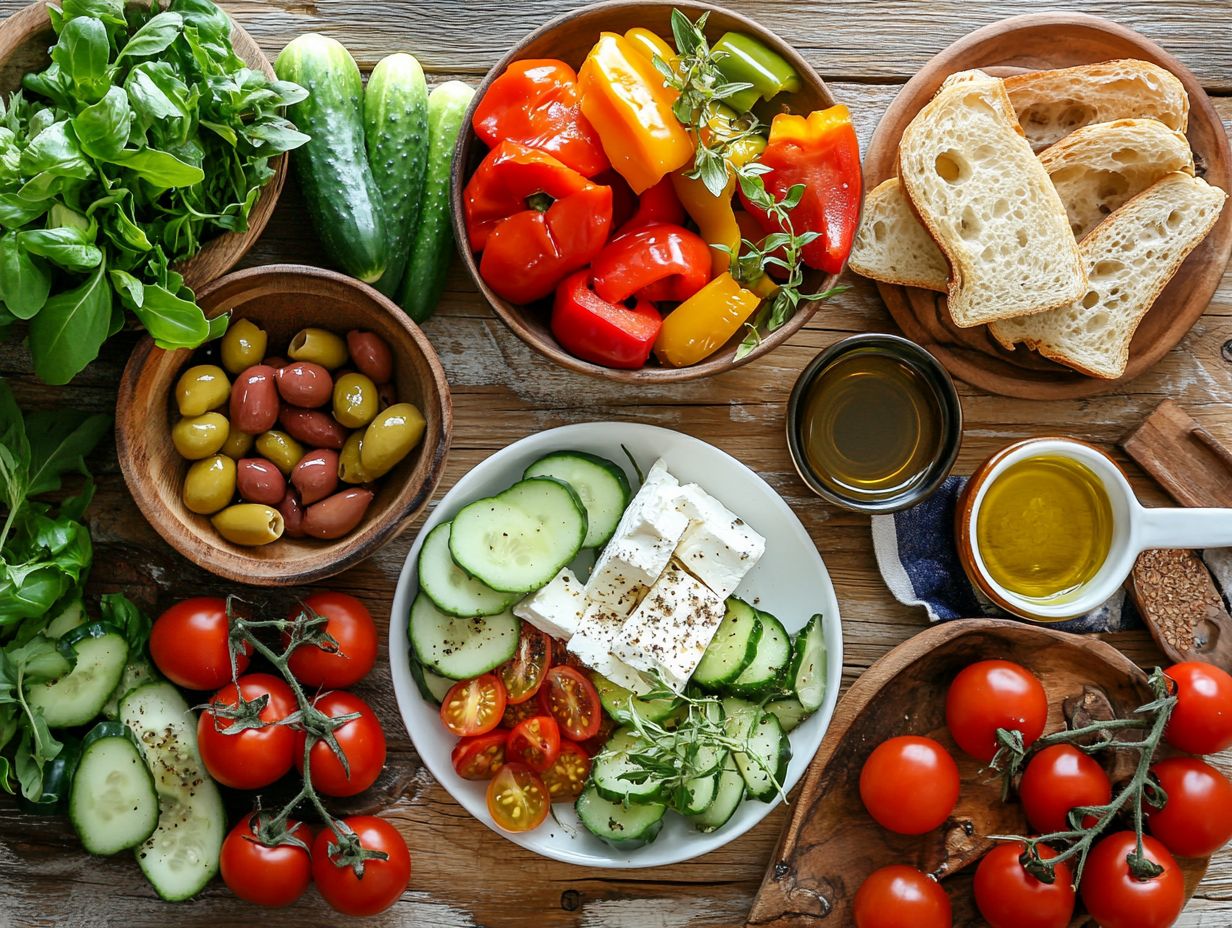
Legumes are a cornerstone of the Mediterranean diet, brimming with protein and fiber. They provide a plant-based alternative that aligns perfectly with dietary guidelines aimed at promoting heart health and managing cholesterol levels, particularly in vibrant communities like Greece and Italy.
These versatile ingredients encompass various beans, lentils, chickpeas, and peas, each offering unique nutritional benefits. For example, lentils are an exceptional source of iron and folate, while chickpeas provide healthy fats and essential minerals like magnesium.
Try these exciting options to incorporate legumes into your meals:
- Craft a hearty lentil soup.
- Toss chickpeas into a fresh salad.
- Blend black beans into a mouthwatering veggie burger.
Their adaptability makes them essential in vegetarian and vegan diets and brings versatility that can elevate any dish.
7. Herbs and Spices
Herbs and spices are essential to Mediterranean cuisine. They enhance flavor while delivering health benefits that contribute to a balanced eating pattern. These ingredients help reduce inflammation and add vital nutrients without extra calories.
Aromatic options like oregano, basil, and rosemary not only elevate the taste of your dishes but also serve as powerful antioxidants. By incorporating fresh herbs into your meal planning, you can transform even the simplest salad or grain dish into something spectacular.
Dried varieties are great for slow-cooked meals, allowing their flavors to meld beautifully over time. To maximize their benefits, add fresh herbs at the end of cooking for a vibrant burst of flavor. Dried herbs can be introduced earlier to deepen their essence, creating a rich tapestry of taste.
Exploring the culinary potential of these natural flavor enhancers will lead you to a delightful balance of flavor and nutrition.
8. Yogur y queso
Yogurt and cheese are beloved staples of the Mediterranean diet, packed with probiotics that promote gut health. They also add delightful flavor and texture to your meals.
These dairy delights reflect the culinary traditions of countries like Greece and Italy. You ll find these products in various forms, such as Greek yogurt, which boasts a thicker consistency and higher protein content, and feta cheese, renowned for its crumbly texture and distinctive tang.
Incorporating them into your meals is deliciously easy! A dollop of Greek yogurt can elevate your smoothies, while feta makes for a charming addition to salads.
Their versatility knows no bounds. Think of a yogurt parfait layered with fresh fruit and nuts for a wholesome treat or a cheese platter accompanied by whole-grain crackers for a satisfying snack.
Embracing yogurt and cheese not only enriches your dishes but also plays a key role in enhancing your overall wellness. Try adding yogurt to your breakfast tomorrow!
9. Red Wine (in Moderation)
Red wine, when savored in moderation as part of the Mediterranean diet, is renowned for its potential heart health benefits. This reputation comes from lots of antioxidants, especially resveratrol, which align seamlessly with dietary recommendations from esteemed health organizations like the Mayo Clinic.
Moderate red wine intake supports heart health by helping to lower cholesterol levels and enhance blood circulation. But it s not just about health; sharing a glass of red wine during communal meals elevates the entire experience.
It creates an atmosphere where you can unwind and engage in meaningful conversations, a vital component of overall well-being. Don t forget that moderation is essential; overindulgence can counteract these benefits and lead to unwanted consequences.
By enjoying a modest amount of red wine, you can delight in an experience that nurtures both your health and your social connections.
10. Lean Protein Sources
Lean protein sources like poultry and seafood are essential to the Mediterranean diet. They provide you with vital nutrients while keeping saturated fat intake low, supporting your heart health.
These protein sources help with muscle repair and growth, ensuring your meals remain satisfying and flavorful. By incorporating lean cuts of chicken, turkey, or a variety of fish, you can elevate a balanced meal.
Consider grilling marinated chicken alongside seasonal vegetables or whipping up a zesty fish dish infused with herbs and lemon. This approach showcases the vibrant flavors of these lean proteins and inspires creativity in your meal preparations.
Make each dining experience both nutritious and delightful!
What Is the Mediterranean Diet and Its Benefits?
The Mediterranean diet invites you to embrace a colorful array of plant-based ingredients, healthy fats, and lean proteins. This approach aligns seamlessly with dietary guidelines that promote a vibrant and healthful lifestyle while effectively addressing inflammation and reducing the risk of chronic diseases.
Rooted in the culinary traditions of countries surrounding the Mediterranean Sea, this diet has gracefully evolved over centuries. Scientific studies consistently highlight that adhering to this diet can significantly lower the risk of heart disease, thanks to its abundant omega-3 fatty acids and antioxidants.
Those who adopt this eating style often enjoy a heightened sense of overall well-being, which manifests as improved mood and sharper cognitive function.
By prioritizing whole foods, practicing moderation, and savoring the joy of shared meals, it becomes remarkably clear why this approach continues to be a cornerstone of healthier living.
How Does the Mediterranean Diet Compare to Other Diets?
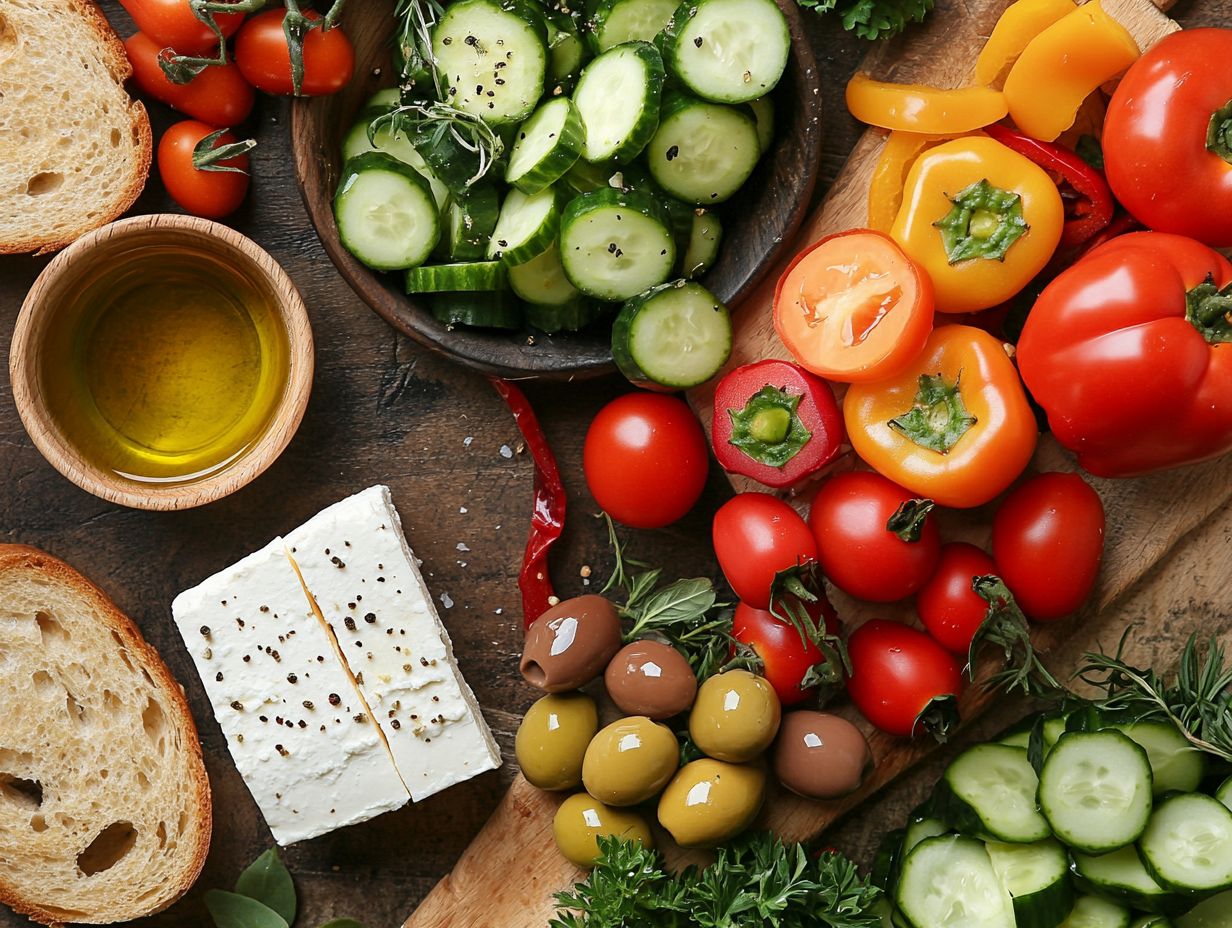
When comparing dietary approaches like the DASH diet to the Mediterranean diet, the latter truly shines. It focuses on whole foods, healthy fats, and a balanced intake of plant-based options.
This combination promotes heart health and fosters a sustainable, enjoyable eating pattern. This distinctive emphasis lowers the risk of cardiovascular diseases while encouraging a lifestyle that values sustainability and the joy of eating.
While the DASH diet targets lower sodium intake and an increase in fruits and vegetables to tackle hypertension, the Mediterranean diet celebrates the rich diversity of its ingredients. This makes it easier for many to stick with.
Both diets encourage eating lean proteins; however, the Mediterranean approach highlights fish and olive oil, which are beneficial fats supporting heart health.
Ultimately, both diets pave the way for enhanced health. However, the Mediterranean style may be particularly appealing if you’re looking for a flavorful and varied way to nourish your body.
What Are the Key Components of the Mediterranean Diet?
The Mediterranean diet is built around key components that elevate your dining experience: a colorful array of plant-based foods, healthy fats from sources like extra virgin olive oil, and a moderate intake of fish and poultry. This combination boosts your heart health and enhances your overall well-being.
Whole grains, legumes, nuts, and seeds take center stage, offering essential fiber and protein. These support digestive health and help stabilize your blood sugar levels.
Meanwhile, fruits and vegetables rich in antioxidants amplify flavors, reduce inflammation, and strengthen your immune function.
By choosing herbs and spices over salt, you can add depth and variety to your meals without the drawbacks of excessive sodium. Embracing these elements, the Mediterranean diet presents a sustainable and enjoyable approach to eating that encourages long-term health and balanced nutrition.
Are There Any Foods to Avoid on the Mediterranean Diet?
While the Mediterranean diet emphasizes healthful eating, be smart about your choices. Limit foods high in unhealthy fats and sugars to maintain better health.
For example, think twice before indulging in red meats and fatty cuts, as they tend to be high in saturated fat. Refined carbohydrates like white bread and sugary pastries can lead to unwanted blood sugar spikes and lack nutritional value.
Fried foods, infamous for their unhealthy trans fats, may also undermine the positive effects of this diet.
Instead, embrace healthier alternatives like lean poultry, whole grains, and healthy fats such as olive oil. These choices align beautifully with Mediterranean principles, fostering heart health and enhancing your overall well-being.
How Can One Incorporate the Mediterranean Diet into Their Lifestyle?
Incorporating the Mediterranean diet into your lifestyle is an enriching endeavor that begins with thoughtful meal planning. Focus on vibrant, plant-based foods, healthy fats, and lean proteins, and consider adding anti-inflammatory foods to your meals while embracing the joy of community dining and shared meals.
Start by creating a shopping list that highlights seasonal fruits, colorful vegetables, whole grains, and legumes. This approach will streamline your transition into this nutritious lifestyle.
When hunger strikes, reach for nutrient-dense snacks like nuts and seeds to keep cravings at bay. For meal prep, consider batch cooking staples such as quinoa or chickpeas. This not only saves time but also ensures you have wholesome options for those busy days.
Dive into delicious recipes featuring grilled fish, roasted vegetables, and homemade tzatziki. These dishes will elevate your dining experience and encourage you to stick with this wholesome lifestyle while fostering a sense of community through shared culinary adventures.
Start your Mediterranean journey today for a healthier, happier life!
What Are Some Delicious Recipes That Fit into the Mediterranean Diet?
Discover delicious Mediterranean recipes! Enjoy vibrant salads filled with fresh greens and nuts.
Indulge in flavorful fish dishes drizzled with extra virgin olive oil for a health boost.
Try a classic Greek salad, a refreshing mix of cucumbers, olives, and feta. It s packed with nutrients and healthy fats!
Don t miss out on grilled salmon, marinated with aromatic herbs. It s not only delicious but also rich in omega-3 fatty acids.
By enjoying these culinary delights, you support heart health and reduce inflammation. The Mediterranean diet is a fantastic choice for a healthier lifestyle!
Frequently Asked Questions
What are the top 10 foods to include in a Mediterranean diet?
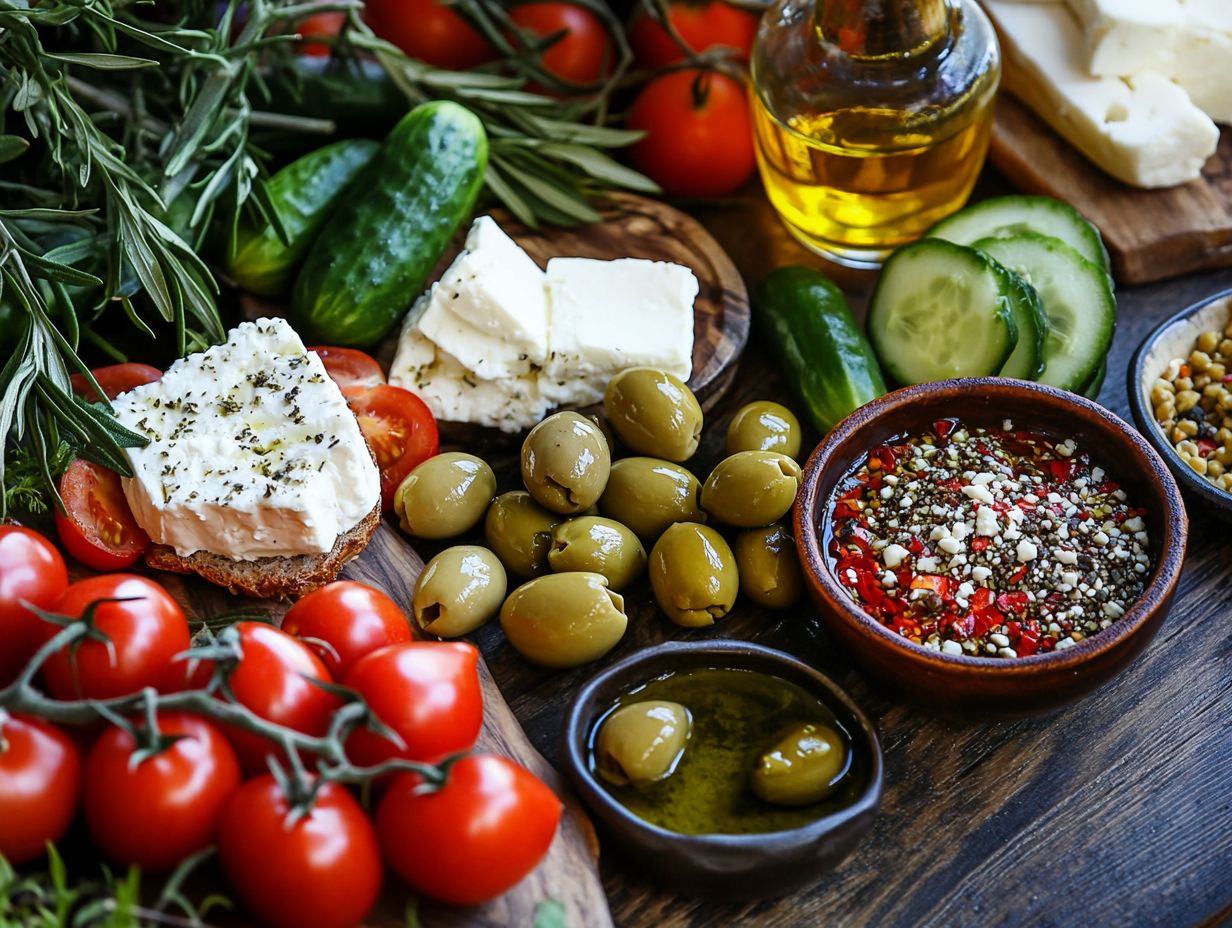
Top foods include olive oil, fish, whole grains, legumes, vegetables, fruits, nuts, herbs, yogurt, and top superfoods to include in your diet, along with moderate red wine.
Why is olive oil an important part of a Mediterranean diet?
Olive oil is a staple rich in healthy fats linked to a lower risk of heart disease.
Can I still eat meat on a Mediterranean diet?
Meat is allowed but should be consumed in moderation. Focus on lean meats and limit red meat to a few times a month.
Why are whole grains important in a Mediterranean diet?
Whole grains like whole wheat, oats, and brown rice provide fiber and essential nutrients. They help regulate blood sugar levels.
Are there any foods that should be avoided on a Mediterranean diet?
Limit processed foods, refined sugars, and saturated fats. They are not part of traditional Mediterranean eating.
Can I still enjoy sweets and desserts on a Mediterranean diet?
Yes! Enjoy healthier options such as fruits, dark chocolate, and honey in moderation.

